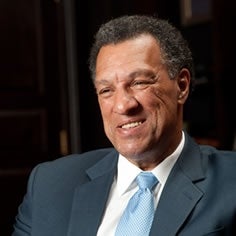Sick leave accrual policies under review at higher ed
 Courtesy
Bridgewater State University President Dana Mohler-Faria had accrued $1 million worth of unused sick and vacation time when he stepped down in 2015.
Courtesy
Bridgewater State University President Dana Mohler-Faria had accrued $1 million worth of unused sick and vacation time when he stepped down in 2015.
After a report on the lucrative benefit package a former state university president received upon leaving state government, changes could be in store for the compensation of public higher education officials in Massachusetts.
The Boston Business Journal reported that former Bridgewater State University President Dana Mohler-Faria, who had worked in state government for four decades, had accrued $1 million worth of unused sick and vacation time when he stepped down in 2015.
The business paper said Mohler-Faria's unused time-off was the equivalent of four-plus years of work and made for a one-time $269,984 payment on top of his $183,421 annual pension and $8,333 per month he receives as an adviser to the school.
"I was as shocked by that story as I think many others were, and we've had conversations with the folks at the Board of Higher Education about it, and it's all based off policy that was put in place in 2012," Gov. Charlie Baker, who took office January 2015, said on Thursday.
On his monthly radio appearance on WGBH on Thursday, the governor said he had told the board changes were needed.
"That policy needed to be reconsidered - the travel policy, the benefit policy, the oversight process and all the rest," Baker told co-hosts Margery Egan and Jim Braude.
The former president is now working on a pro-bono basis, Higher Education Commissioner Carlos Santiago said in a statement Thursday.
Santiago said he has initiated a 30-day review of "decades-old leave policies and practices" for professionals in the state's public higher education system who are not covered by union contracts, and sought recommendations for changes to "sick leave and vacation time accrual and documentation of leave time in accordance with internal control plans."
Recommendations will be made to the Board of Higher Education's Fiscal Affairs and Administrative Policy Committee at its April 26th meeting, Santiago said. The commissioner said Mohler-Faria had been hired by the Bridgewater State University Board of Trustees to, among other duties, raise funds for the Martin Richard Institute for Social Justice, named after a victim of the Boston Marathon bombings.
In the interview with the governor, Egan noted other instances in government of accrued time off and questioned whether that practice should occur at all.
"I would say no," Baker replied. "But at the same time you can't take something away from somebody on a retroactive basis, right? You can only take it away from them on a prospective basis when you're dealing with this, which is why I'm hoping we'll be pursuing a set of new policies that will deal with this issue."
The governor, who has served in advocacy roles, in cabinet posts for the Weld and Cellucci administrations and as the chief of Harvard Pilgrim Health Care, said the accrual of sick time is abnormal in his experience.
"Almost every organization I've ever worked in sick time is something that you use annually. There's no such thing as sort of an accrued amount," Baker said. He said, "You shouldn't be able to accrue it."
Pressed by Egan, Baker said the administration would look at other sick-time policies beyond higher education.
The Massachusetts Fiscal Alliance, a politically active non-profit, last week pressed for State Auditor Suzanne Bump to investigate Mohler-Faria's deal, saying it "insults the hardworking taxpayers of Massachusetts."
Bump will meet with Bridgewater State University President Frederick Clark later this week to review the results of his internal investigation and the auditor's office could consider conducting its own audit, according to a Bump spokesman.









0 Comments